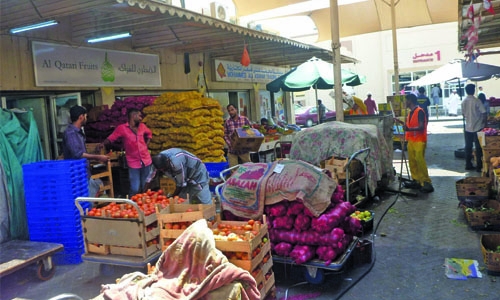Food supply sufficient for Ramadan, traders in Central market say
Manama : Foodstuff traders yesterday confirmed that the market is ready to welcome the holy month with sufficient supply of food materials.
They also ruled out any possibilities for shortages during the month confirming that prices of staple foods from red meat, vegetables and fruits in Bahrain are still the lowest in price in the GCC countries.
The demand, according to traders, will drop by the fifth day of Ramadan or the first week as most of the purchases will be made during that period.
A meat trader in the central Manama market, Sayed Nasser Al-Hulaibi, said that the demand for meat during Ramadan increases by 60 percent to 70pc compared to normal days. He confirmed that the market is fully prepared to meet the needs of consumers during the holy month.
Red meat, Al-Hulaibi said, is imported from Australia, Pakistan, Ethiopia and Sudan. Australian meat is ranked top by individual consumers and restaurants.
He explained that each trader in the central Manama market offers around 80 to 100 cows and 200 to 300 sheep a day, adding that there are currently seven companies importing meat, which also resulted in breaking the monopoly of the Bahrain Livestock Company.
According to Al-Hulaibi, prices of red meat are accessible to all and are still cheaper when compared to other GCC countries, where the price for one kilogram reaches BD2,500.
Poultry supply stable
On poultry supply, Al-Hulaibi said traders have stocked supplies in large quantities to meet the daily demand. “People prefer local poultry, if not available they will resort to Saudi product.” Another meat dealer at the central Manama market, Ali Jumah Abu Jaber, said that meat is a basic ingredient during the holy month.
According to him, red meat offers better health benefits when compared to other varieties. He also ruled out any crisis during the holy month citing the diversity of import sources.
Poultry merchant in the central Manama market, Mahmoud Sadiq, said that Saudi chickens are available in larger quantities when compared to Bahraini chickens. Demand for poultry is three times more in Ramadan.
Demand not strong
Sadiq, however, said that the demand for poultry in the central markets is no longer as strong as it was in the past. This, he said, is mainly due to the advent of large hypermarket and air-conditioned commercial complexes, making it the preferred choice for many consumers.
Sadiq explained that each trader offers a total of 100 to 200 chickens during the beginning of the holy month, noting that demand exceeds the supply in the first week of Ramadan, and returns to normality by the middle of the holy month.
Sadiq confirmed the stability of poultry prices of all brands and sources, where the price of a kilo of is 1.200 dinars.
Sadiq also confirmed the availability of eggs from Kuwait, Turkey, Saudi Arabia, India, the Netherlands and Ukraine. Bahraini eggs, however, are expensive because of the high demand for it.
3500 tons of vegetables per day
A vegetable and fruit dealer at the Manama Central Market, Reda Al-Bustani, said that 3500 tons of all kinds of vegetables, fruits have been put on a daily basis since last Tuesday, and is expected to put 4500 tons on the first day of the holy month of Ramadan.
He said the demand for vegetables and fruits will decline gradually from the fifth day of the holy month, and return again with the payment of salaries later this month.
He said that the production of vegetables and fruits in the summer season is slow in the GCC countries like Saudi Arabia, the United Arab Emirates and Oman, where they all depend on Jordan, as well as Egypt, India, Pakistan and other European countries.
Mint, coriander, cucumbers
On the most important commodities required during Ramadan, Al-Bustani confirmed that they include weeds such as parsley, mint, coriander, vegetables such as cucumbers, tomatoes, potatoes, pumpkins and lettuce, fruits such as red watermelon, melons, grapes, mangoes, cherries, apricots, plums and nectarines.
Al-Bustani noted that 70pc of the imported vegetables and fruits are transported through the King Fahd Causeway, 20pc through the Bahrain International Airport and the remaining 10pc by sea via Khalifa Port.
He also called on the public not to resort to excessive purchases or storage of Ramadan goods with all products available.
Related Posts

